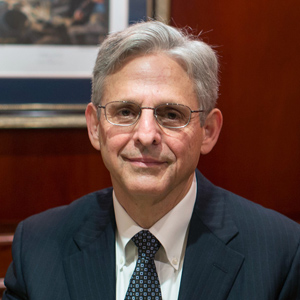Obama announces Merrick Garland as US Supreme Court nominee

Judge Merrick Garland. Photo from the White House.
President Obama has announced that he is nominating Judge Merrick Garland to fill the U.S. Supreme Court vacancy created by the death of Justice Antonin Scalia.
Garland, chief judge of the U.S. Court of Appeals for the D.C. Circuit, is considered a moderate, particularly on issues involving criminal justice and national security. Obama urged a fair hearing and a vote on Garland, stressing that the judge has had previous support from lawmakers in both parties.
“The reputation of the Supreme Court will inevitably suffer; faith in our justice system will inevitably suffer” absent Senate consideration of Garland, Obama said. “He deserves to be confirmed.”
The president said Garland, who was appointed to the D.C. Circuit in 1997, has a record of “decency, modesty, integrity, even-handedness and excellence.” He understands that law is more than an intellectual exercise and understands how it affects people, Obama said.
Garland’s voice broke as he called the nomination the greatest gift he has ever received, with the exception of the births of his daughters. Addressing Obama at the end of his speech, Garland said he is “grateful beyond words for the honor you have bestowed upon me.”
Garland said his mother, a PTA volunteer, instilled in him the importance of public service. His father, who ran a small business from his basement, stressed the importance of hard work and fair dealing.
Garland grew up in Chicago and put himself through Harvard Law School, working as a tutor and a clerk stocking shelves in a shoe store, Obama said. He even sold his comic book collection to raise money, Obama said.
The president referred to “traditional marks of excellence” in Garland’s early legal career. He clerked for Judge Henry Friendly of the 2nd U.S. Circuit Court of Appeals and for U.S. Supreme Court Justice William Brennan. Though Garland quickly attained partnership at Arnold & Porter, he left within months to become a federal prosecutor, trading a corner office for a workplace that “smelled of stale cigarette smoke,” Obama said.
Garland’s sterling record as a prosecutor led to a job in the U.S. Justice Department, where he supervised the prosecution of Oklahoma City bomber Timothy McVeigh and the Unabomber, Ted Kaczynski.
Several publications had advance reports on Garland’s expected nomination, including the New York Times, the Washington Post and the Associated Press.
Garland is 63, which “is somewhat aged for a Supreme Court nominee,” according to the New York Times.
Garland has hired several clerks who went on to clerk for Supreme Court justices, the National Law Journal (sub. req.) reports. Those clerks worked for both conservative and liberal justices.
SCOTUSblog published a story on Garland in 2010. “Judge Garland’s record demonstrates that he is essentially the model, neutral judge,” the blog said. “He is acknowledged by all to be brilliant. His opinions avoid unnecessary, sweeping pronouncements.” At the time, Garland was said to be on a short list to replace Justice John Paul Stevens.
Obama informed supporters in an email that he was fulfilling his constitutional duty by announcing the nomination on Wednesday. “I’m doing my job. I hope that our senators will do their jobs, and move quickly to consider my nominee,” he wrote.
Prior reports said Obama had narrowed his list of potential nominees to three appeals judges: Garland, Sri Srinivasan of the D.C. Circuit, and Paul Watford of the 9th Circuit.
According to the Times, the announcement was “expected to kick off a months-long political stalemate and become a searing issue on the campaign trail.”
Obama is making a nomination despite Republicans’ vow that they will not hold a confirmation hearing. Democrats hope that Republican senators who are vulnerable in elections will push for a vote.
Shortly after Obama’s announcement, Republican Senate Majority Leader Mitch McConnell made a speech on the Senate floor, vowing not to consider Garland. He contended that no hearings should be held until after the new president takes office in 2017, to “give the people a voice in the filling of this vacancy.”
Republican chairman of the Senate Judicial Committee Charles Grassley agreed, saying that “a lifetime appointment that could dramatically impact individual freedoms and change the direction of the court for at least a generation is too important to get bogged down in politics,” the AP reports.
The Republican refusal will be used by Democrats as an election issue, according to David Greenberg, a professor of journalism, history and media studies at Rutgers University. Democrats will promote the idea that “the Republican Party is the party of nothing,” Greenberg told the Washington Post.
ABA President Paulette Brown released a statement Wednesday, saying in part: “The American Bar Association has as one of its four goals, to advance the Rule of Law. Consistent with this goal, over the past several decades, the American Bar Association has approved policies that urge the president to fulfill constitutional responsibilities and make nominations promptly to fill any Supreme Court and lower federal court vacancies, which has occurred. Our policies call for the Senate likewise to fulfill its constitutional responsibilities to consider and act promptly on the nominees. As the national representative of the legal profession, it is important for us to reiterate our longstanding guidelines and urge the Senate to adhere to the Constitution without regard to political preference.”
Brown pointed out that 4-4 rulings by the U.S. Supreme Court do not establish precedents, and urged the Senate to continue the nomination process “with all deliberate speed.”
Updated at 12:11 p.m. to include ABA President Paulette Brown’s statement.



